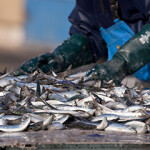Norway Fisheries State Secretary Vidar Ulriksen snaps back against complaints of Irish organizations

Brexit appears to have added to tensions in the busy fishing waters in the west Atlantic, with tempers rising intalks between the European Union and Norway and a rise in enforcement actions by Irish authorities against British vessels.
Data provided to SeafoodSource by the Sea Fisheries Protection Authority (SFPA), a state agency that monitors all vessels operating within the Irish exclusive economic zone with the support of the Irish Naval Service, show there has been an increase in inspections and enforcement actions by Irish authorities in the country’s waters.
The total number of inspections of non-Irish vessels in 2022 was 876, compared to 673 equivalent searches in 2021. There was a big surge in enforcement actions against U.K. vessels in 2022 with 10 cases taken, compared to two for cases against vessels from France and one case against a Spanish vessel.
By contrast, in 2021, Irish authorities conducted no inspections of British vessels and six inspections of Spanish vessels, two on French vessels and one inspection each on a Belgian and a Norwegian vessel.
“[SPFA] reviews and assesses their declared catches for compliance with E.U. sea-fisheries legislation,” it said in a statement to SeafoodSource.
Brexit has also driven Irish actions at E.U. level. Bitter about what it sees as a disproportionate price paid by Ireland in terms of quota given to Britain in the Brexit settlement, Irish fishing authorities and politicians have leaned heavily on the E.U. not to concede Irish quota for blue whiting in difficult negotiations with Norway over access to fishing stocks straddling both sides’ waters.
The Irish Fish Producers Organisation’s claim Norway doesn’t deserve more blue whiting access because it has been overfishing the species (used largely for fishmeal) by an average 10 percent per year were sharply rejected by Norwegian Ministry of Trade, Industry, and Fisheries State Secretary Vidar Ulriksen, who in turn suggested that E.U. states have themselves been overfishing.
“Like several of the recent statements from Irish industry representatives, this one is also wrong. Norway does not overfish either mackerel nor blue whiting. We adhere to our quotas and, just like the E.U., we have a system of inter-annual quota flexibility of plus or minus 10 percent,” Ulriksen told SeafoodSource. “Moreover, Norway has kept our national blue whiting quota at traditional levels, in accordance with the last agreed sharing arrangement, whereas the E.U. has increased [its quota by] 12.7 percentage points of TAC [total allowable catch]. So, if anything, it is the E.U. and, by extension, Ireland that operate with inflated quotas of blue whiting.”
In response to Ulriksen’s remarks, Irish Fish Producers Organisation CEO Aodh O’Donnell said Ulriksen is “correct to affirm that there is no [current] sharing agreement between E.U. and Norway.
“There are total allowable catches set to underpin the sustainable management of these stocks,” O’Donnell said. “This E.U. annual quota is in contrast to the inflated unilateral quota that Norway has set itself year after year, in the absence of a coastal state agreed quota-sharing arrangement.”
O’Donnell said Norway’s approximate mechanism utilization process “result[ed] in a landing overshoot accumulation of almost 200,000 tons over seven consecutive years.”
Still smarting from the losses it took in the Brexit settlement, Ireland’s fishing industry doesn’t want to be forced to make further significant concessions as a result of the E.U.-Norway negotiations. Ulriksen said his counterparts in Brussels are offering ...
Photo courtesy of hongtatchee/Bishan-Toa Payoh GRC




Share